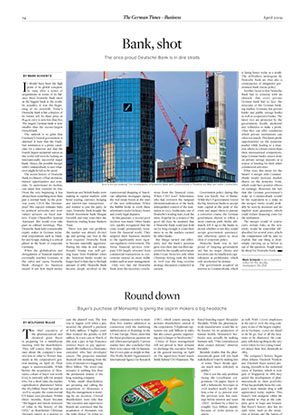The once-proud Deutsche Bank is in dire straits

It should have been the high point of its global conquest. In 1999, after a series of acquisitions, in terms of its balance sheet Deutsche Bank rated as the biggest bank in the world. In actuality, it was the beginning of its downfall. Today’s Deutsche Bank is but a shadow of its former self. Its share price, at $144 in 2007, is now less than $10. The largest German bank is now smaller than the second-largest French bank.
The outlook is so grim that Germany’s federal government is alarmed. It fears that the Frankfurt institution is a prime candidate for a takeover and that the fourth largest industrial nation in the world will soon be lacking an internationally successful major bank. Hence, the possible merger with Commerzbank, to save whatever might be left to be saved.
The recent history of Deutsche Bank is a history of bad decisions, missed opportunities and scandals. To understand its decline, one must first consider its rise. From the very beginning, it has always been something more than just a normal bank. In the postwar years, CEOs like Herman-Josef Abs enjoyed intimate links to political networks and were valued advisors on fiscal matters. Under Chancellor Konrad Adenauer, Abs would even take part in cabinet meetings. Plus, Deutsche Bank held considerable equity stakes in German industrial
corporations such as Daimler and Krupp, making it a critical player at the heart of corporate Germany.
When the globalization and deregulation of financial markets eventually reached Germany in the 1980s and 1990s, Deutsche Bank changed its business model. It saw how much money American and British banks were making in capital markets with bond trading, currency hedging and interest-rate transactions – and wanted to join the party. In 1990, Deutsche Bank bought the British investment bank Morgan Grenfell, and nine years later the American trading house Bankers Trust.
There was just one problem: the market was already divvied up, and getting one foot in the door required Deutsche Bank to become especially aggressive. During his time in real estate, Donald Trump was still getting loans from Frankfurt when the American banks would no longer lend to him due to his high amount of debt. Deutsche Bank became deeply involved in the controversial shopping of American subprime mortgages during the real estate boom at the start of the new millennium. When the bubble broke in 2008, these adventures ended in heavy losses and costly legal disputes.
At this juncture, a second poor decision was made. Other banks very quickly recognized that the crisis would permanently transform the financial world. They adapted their business models to the significantly more rigorous regulatory environment. The Swiss financial services company UBS largely retreated from commercial transactions to concentrate instead on more stable realms such as asset management.
Only very late did Deutsche Bank draw the necessary conclusions from the financial crisis. When CEO Josef Ackermann, who had overseen the rampant internationalization of the bank, relinquished control of the institution in 2012, Anshu Jain, one of Deutsche’s trading stars, took the reins. Hopeful for a return of the good old days, he assumed that if Deutsche Bank could just hold on for long enough, it could then move in on the markets vacated by other banks.
But things turned out differently and the bank’s position grew ever direr. Jain was then succeeded by the equally unfortunate John Cryan. However, only when Christian Sewing took the helm in 2018 was the long-overdue strategy discussion conducted in earnest.
Government policy during this time was hardly free of blame. While the US government forced the big American banks to accept state capital at the peak of the crisis and urged them to pursue a corrective course, the German government elected to follow a more cautious path. Berlin ultimately left it up to the banks to decide whether or not they would accept government assistance, and otherwise opted to steer clear of corporate policy.
Deutsche Bank was in fact proud of forgoing government aid, but its major clients and investors saw its insufficient capitalization as problematic, which only accelerated its demise.
The government acquired an interest in Commerzbank, which is faring better today as a result. The difficulties undergone by Deutsche Bank are thus also a consequence of misguided government bank-rescue policy.
Another factor is that Deutsche Bank had to contend with an obstacle that every private German bank had to face: the structure of the German banking market. Germany has private banks and public savings banks as well as cooperative banks. The latter two are protected by the government, locally anchored and forbidden to make a profit. Thus they can offer conditions which private institutions can often not match. This limits profit opportunities on the domestic market while leading to a situation where, to a lesser extent than their international competitors, large German banks cannot draw on private savings deposits as a source of funding for their other commercial activities.
What does this mean for the future? A merger with Commerzbank would increase market shares on the domestic front, which could have positive effects on earnings. Moreover, the fact that the German government’s stake in Commerzbank would be the equivalent to a stake in the merged entity would probably be seen by investors and an implicit state guarantee, which could reduce financing costs for the institution.
The merger would of course carry certain risks, as the new entity would be somewhat self-absorbed for several years, which the competition will be sure to exploit. But one thing is clear: simply carrying on as before is out of the question. Tough times lie ahead for Deutsche Bank.
Mark Schieritz
is the economic policy correspondent in the Berlin bureau for the weekly Die Zeit.



